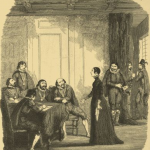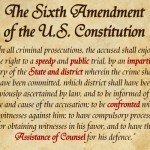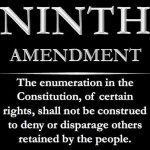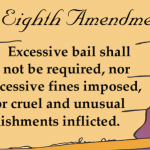It certainly seems obvious and fair that when the government charges someone with a crime that the person be told what law he has violated and what he did to violate that law. That a government does not always conduct itself in a fair manner and that it needs to be reminded of the obvious […]
Sixth Amendment’s Right to a Jury in Criminal Cases
The list of colonial grievances against King George in the Declaration of Independence included: “For depriving us in many cases, of the benefits of Trial by Jury: … He has abdicated Government here…” In Article III, the unamended Constitution provided for jury trials in criminal cases[1] as follows: “The Trial of all Crimes, except in Cases […]
Sixth Amendment’s Public Trial: From Communal Duty to Accused’s Right
The Constitution’s Bill of Rights contains many procedural protections for those the government accuses of having committed a crime. Among them is the Sixth Amendment right to a “public trial”. The provision is stated: “In all criminal prosecutions, the accused shall enjoy the right to a… public trial” The concept of a public trial is ancient, but it did […]
Sixth Amendment’s Speedy Trial Right: Ancient, Worthy and Elusive
The Constitution’s Bill of Rights contains many protections for those the government accuses of having committed a crime. Among them is the Sixth Amendment right to a “speedy trial”. The provision is stated: “In all criminal prosecutions, the accused shall enjoy the right to a speedy … trial” The right may has old roots and […]
The Sixth Amendment’s Right to the Assistance of Counsel
Thanks to television police reading the Miranda Warnings people are familiar with a criminal defendant’s right to an attorney and that an indigent defendant may have appointed counsel. Such protections have not always been part of United States law. The right to an attorney is found in the Constitution’s Sixth Amendment. The Sixth Amendment was ratified as part of the Bill […]
Fourth Amendment Probable Cause for a Warrantless Arrest
A police officer cannot arrest a citizen without a warrant based upon a hunch or mere suspicion. He must have “probable cause”. The US Constitution‘s Fourth Amendment[1] requires a warrant for a person or his property to be “seized” or searched by a government agent. The law has developed allowing government agents to conduct warrantless […]
The Sixth Amendment, One Amendment, Six Constitutional Rights
The Sixth Amendment contains rights beyond the well-known right to an attorney in criminal matters. There are six constitutional rights in the Sixth Amendment. They are procedural rights designed to protect an individual’s inalienable natural rights of life and liberty found in the Declaration of Independence. The Sixth Amendment is part of the Bill of Rights, […]
The Tenth Amendment to the US Constitution
“The Tenth Amendment is the foundation of the Constitution.” – Thomas Jefferson Among the questions raised by opponents of the Constitution during the ratification debates was the lack of an express limit on federal power, and that it would be a danger to individual freedoms and to the powers of the states. In response to […]
Constitution’s Ninth Amendment: Protecting Unenumerated Rights
On September 17, 1787 the drafting of the American Constitution was complete. The proposed document was not without its detractors and several delegates who participated refused to sign the document.[1] A major objection was the lack of specific protections for individual freedoms. The document provided that it would become effective with the ratification of nine […]
Eighth Amendment: Banning Cruel and Unusual Punishment
The Eighth Amendment to the US Constitution is part of the Bill of Rights. Along with the Fourth, Fifth and Sixth Amendments it recognizes procedural rights for persons accused of crimes. The purpose of these procedural rights is to protect an individual’s inalienable natural right to liberty. When originally ratified in 1791, the Bill of […]














